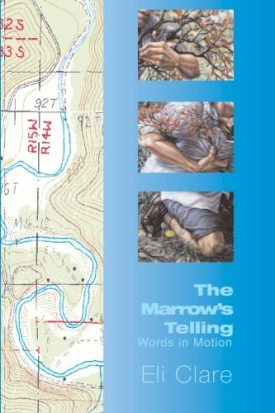The Marrow's Telling: Words in Motion
A Lambda Literary Award finalist in 2008.
Description · Purchase · Audio Files · Excerpts · Praise


A collection of poetry and prose spanning 15 years, The Marrow’s Telling: Words in Motion explores how bodies carry history and identity over time.
Embracing contradiction and repetition, Eli maps his work around embodied experiences of disability, race, gender transgression and transition, violence, rural life and sexuality.
Listen to the audio files:
To listen in your web browser, click on the links, or download them to your computer by right clicking (or control click) on the links and then choose “Save link as….”
Excerpts
Echoes: A Preface
I grew up in a narrow valley, the river and a single expansive hayfield squeezed between steep hills. My siblings and I spent many an hour at the gravel bar, abandoned apple orchard, milk barn. We were allowed to wander as far as our mother’s voice could reach. Before supper, she’d step out the back door and send a holler rolling through the valley.
I started work on The Marrow’s Telling knowing that history and identity send echoes through our bodies. The reverberations bounce around inside us, sometimes fading into silence, but often lingering, amplified in the body’s bellows and chambers. I set out to explore the chaos of these echoes. I pulled poems and prose pieces from two decades of writing, seeking not coherence but complexity. I remembered how a valley carries a morning-time holler in one way, an evening-time holler in another; how summer air cradles sound differently from winter air.
In the United States, too many of us have been taught to fear or avoid poetry, to feel bored or stupid in its presence. As an activist-poet, I want this book to be a door held wide open. Read it like a demonstration, a riot, a late night spray-painting action.
Laying poem next to poem, I invited contradiction as well as repetition. In the process of revision, I made myself a deal. I could strengthen the language but not change the story. The poem written 15 years ago about the first Gulf War couldn’t morph into being about the current war in Iraq. The story about coming out as a dyke in the backwoods of Oregon had to keep its shape, even though I live today as a genderqueer, a white guy on the streets, not yearning back toward dyke identity but unwilling to abandon that part of who I’ve been. I wanted this book to gather and weigh the echoes in the same ways our bodies do.
Don’t start at the beginning nor finish at the end. Read this book as if it were a rollercoaster, a parachute opening above you, a slow meandering river.
We rarely heard her voice but rather its echoes bouncing back. We’d leave whatever we were doing, our initial reluctance overcome by a desire for food and dry clothes. Race up the hill, hay in our hair, mud smeared on our pants, tracing the echoes back to their source.
Don’t worry about chronology; at the bottom of each piece, I’ve left a track, a date, a reference point.
The stories in the following pieces range from the damage reeked by Christian missionaries to a retelling of my birth, from child sexual abuse to disability politics. They emerge from no one source but many—intimate history, community knowledge, activist thinking, letters of a long-ago white explorer and the sweep of my imagination today, all intertwined, all somehow connected to the body.
Let the six “Interludes” be pauses, exhortations for each of us to tell a tangle of stories, to translate them across chasms and listen hard in our home communities. Allow your own breath to be a single thread wending its way through these pages.
In the end, I stand at the crossroads where private and political, public and personal meet, but I don’t want to stand here alone. And so, please, join me in chasing echoes down to the marrow, tracing their sources back to a lover’s hand, a bully’s taunt, a wild blue sky.
Learning to Speak
Three years old, I didn’t talk,
created my own sign language,
didn’t walk but stumped
all over the house on my knees
growing thick calluses.
Words slow dance
off my tongue, never leap
full of grace. They hear
blank faces, loud simple replies.
I practiced the sounds th, sh, sl
for years, a pianist playing endless
hours of scales. I had to memorize
the muscle of my tongue.
Angels
Late afternoons as shadows
overtake the valley, I lay myself
in the riffle where stream
meets river, water warmed all day
and still cold, current pulls, finger bones
tremble. I hang onto rocky bottom
long as I can, then give way,
body rushing downstream
to steadier water. Dive deep
to swim along the green
gold river bed, salmon
nibble, lungs strain. And finally
after the sun has disappeared,
hills leaning closer, I leave
the clasp of angels, return
to weight of bone and muscle.
Praise
"The Marrow’s Telling is tactile, tangible, penetrating; a soft swirl of muted colors that sneaks in under your guard and leaves a lingering taste in your mouth, rather like woodsmoke or blood."
Raven Kaldera, author of Hermaphrodeities Tweet
"Eli Clare works a vital alchemy in these poems. Using the language of the elemental world, he delineates a complex human intersection and transmutes cruelty into its opposite—a potent, lifegiving remedy."
Alison Bechdel, creator of Fun Home and Dykes to Watch Out For Tweet
"Eli’s work detonates inside of you, right to the edges where you balance."
Amber Hollibaugh, author of MY DANGEROUS DESIRES: A Queer Girl Dreaming Her Way Home Tweet
